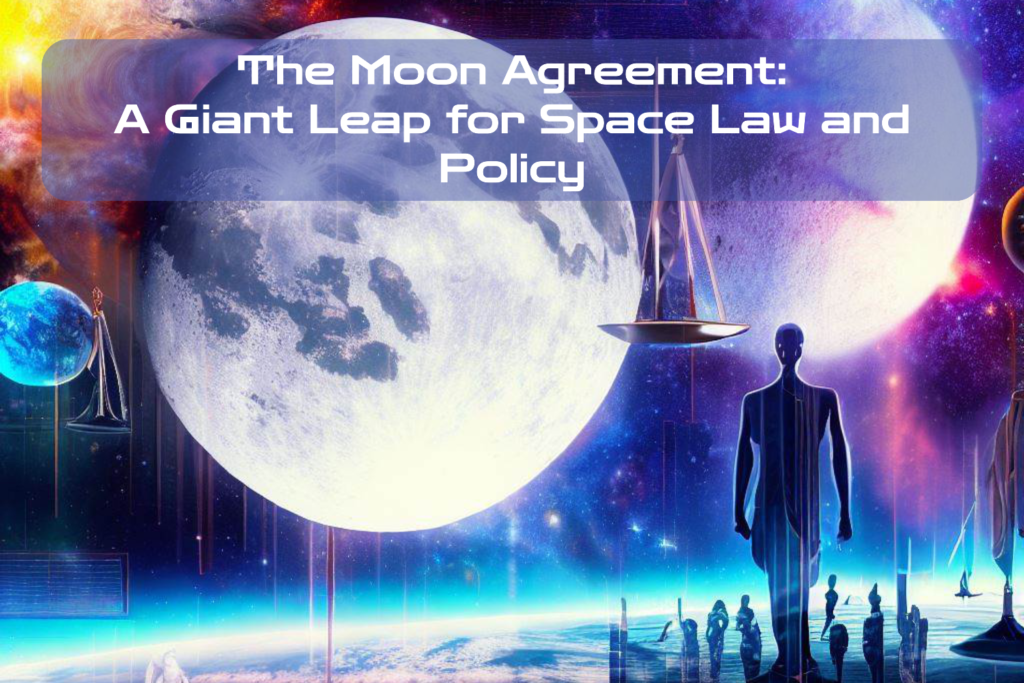The Need for Space Law and Policy
Since humans first set eyes on the night sky, they have been fascinated by the mysteries that lie beyond Earth’s atmosphere. With advances in technology, space exploration has become a reality.
However, with this progress comes a need for regulation and governance of activities in outer space. The absence of legal frameworks would leave room for chaos and conflict between nations, corporations, and individuals seeking to exploit resources.
Space law and policy are essential to ensuring peaceful cooperation in the exploration and utilization of outer space while safeguarding the interests of all parties involved. It also helps mitigate risks associated with space activities, such as debris resulting from satellite collisions.
Brief History of Space Exploration
Space exploration dates back to ancient times, when civilizations observed celestial bodies for religious and navigational purposes.
In modern history, the Soviet Union launched Sputnik 1, the world’s first artificial satellite, in 1957. This event marked the beginning of an era that saw rapid development in space technology and exploration.
The United States soon followed with its own program, that culminated in landing a man on the moon in 1969. Since then, many countries have joined the race to explore outer space with missions to Mars and Jupiter, among others.
The Importance of Moon Agreement
The Moon Agreement is a treaty adopted by United Nations General Assembly (UNGA) in 1979 but entered into force only after ratification by five countries, including Austria, which deposited instrument of ratification on July 11,1984.
The agreement recognized that celestial bodies, including the Moon, are the common heritage of mankind.
It sets out guidelines for
- exploring,
- exploiting resources,
- protecting the environment, including cultural heritage, etc.
It was created amid concerns over potential conflicts arising from commercial exploitation by private entities or individual states.
The Moon Agreement has been instrumental in shaping space law and policy by providing a framework that balances the interests of all parties. Its provisions promote international cooperation while safeguarding the environment and cultural heritage.
However, it also faces criticism and challenges from major space-faring nations such as the United States, which has not ratified or recognized it.
Despite this, the Moon Agreement remains an essential document that highlights the need for international cooperation in outer space activities.
Overview of the Moon Agreement

Explanation of what the Moon Agreement is and its purpose
The Moon Agreement is a treaty that was adopted by the United Nations General Assembly in 1979 and came into force on July 11, 1984.
Its full name is The Agreement Governing the Activities of States on the Moon and Other Celestial Bodies.
The agreement aims to set out a legal framework for activities related to outer space, specifically regarding the moon and other celestial bodies. One of the main goals of the Moon Agreement is to promote peaceful exploration and use of outer space while also protecting these celestial bodies as a common heritage of mankind.
This means that all countries have equal rights to explore outer space, without any one country claiming ownership over any part of it.
By creating this legal framework for states, it helps prevent conflicts and misunderstandings that could arise from competing claims over resources in outer space.
Key provisions of the agreement
Some key provisions included in The Moon Agreement include:
– Recognition that celestial bodies are not subject to national appropriation
– Obligation for states to inform the United Nations about any activities they plan to undertake on any celestial body
– Measures for environmental protection on celestial bodies
– Requirement for cooperation among nations in exploration and use of outer space
– Prohibition against military operations or installations on any celestial body
It’s important to note that not all countries have signed or ratified The Moon Agreement.
As such, some countries may not be bound by its provisions. Nonetheless, many experts agree that it provides an important guideline for responsible behavior in space exploration and exploitation.
Significance of the Moon Agreement for Space Law and Policy

Role in promoting the peaceful use of outer space
One of its most significant provisions is that it promotes the peaceful use of outer space.
Essentially, this means that countries must refrain from using outer space for military purposes and instead focus on peaceful activities like scientific research and exploration. This provision is crucial because it helps prevent conflicts between nations over resources and territory in space.
It also reflects the idea that outer space belongs to all humanity, not just a select few countries with advanced technological capabilities. By promoting peaceful uses of outer space, the Moon Agreement helps ensure that everyone can benefit from its resources.
Protection of celestial bodies as a common heritage of mankind
Another important aspect of the Moon Agreement is its recognition that celestial bodies like the Moon and asteroids are part of the common heritage of mankind. This means that no country or company can claim ownership of them or their resources.
Instead, these resources should be used for the benefit of all people. This provision has significant implications for future commercial exploitation in space.
While some private companies may seek to mine minerals from asteroids or establish colonies on other planets, they cannot claim exclusive ownership over these areas under international law. The Moon Agreement ensures that these activities must be done for everyone’s benefit instead.
Promotion of international cooperation in space activities
One key goal of the Moon Agreement is to promote international cooperation in space activities. This includes sharing knowledge and technology between countries to advance our understanding and exploration of outer space. This emphasis on collaboration has been critical in making major advances in science and technology related to exploring our solar system and beyond.
By working together, countries can pool resources and expertise to achieve more than they could on their own. The Moon Agreement helps facilitate this cooperation by establishing guidelines for how countries should interact and coordinate in space exploration.
Criticisms and Challenges to the Moon Agreement

Resistance from major space-faring nations, including the United States
Despite the potential benefits of the Moon Agreement, it has faced significant resistance from major space-faring nations such as the United States. The US has not ratified the agreement and has instead pursued its own policies for exploring outer space.
One of the main reasons for this resistance is concern over restrictions on commercial exploitation and ownership rights of celestial bodies. The US opposes any agreement that limits its ability to access resources in outer space and believes that private companies should be allowed to exploit these resources for their own economic benefit.
Other major space-faring nations, such as Russia and China, have also been reluctant to ratify the Moon Agreement due to similar concerns over commercial interests. This lack of support from major players in the international community has limited the effectiveness of the agreement and made it difficult to enforce.
Criticisms regarding ambiguity, enforceability, and practicality
Another challenge facing the Moon Agreement is criticism over its ambiguity, enforceability, and practicality.
Some critics argue that certain provisions are vague or open to interpretation, which may lead to confusion or disputes in implementation. Additionally, there may be difficulties in enforcing certain provisions given the limited resources for monitoring activities in outer space.
Furthermore, some have questioned how practical it is for countries to share resources on celestial bodies when there may be competing interests or disputes over ownership rights. Additionally, private companies seeking to exploit resources on celestial bodies may not necessarily adhere to international agreements or regulations.
While these criticisms are valid concerns, proponents argue that these challenges should not detract from the overall importance of establishing a framework for peaceful cooperation regarding outer space activities. The Moon Agreement serves as an important starting point for shaping future discussions around the responsible use and exploration of outer space.
Potential for increased cooperation among nations in exploring outer space
The Moon Agreement has the potential to facilitate increased cooperation among nations in exploring outer space. By promoting the peaceful use of space and establishing celestial bodies as a common heritage of mankind, the agreement sets the foundation for international collaboration in space activities.
As space exploration becomes increasingly expensive and risky, it is likely that more countries will find it beneficial to work together in order to achieve their goals.
One example of such cooperation is the International Space Station (ISS).
The ISS is a collaborative effort involving multiple countries, including the United States, Russia, Japan, Canada and several European nations. It serves as a symbol of peace and diplomacy in a world that often struggles with such concepts.
The success of this project demonstrates that when nations work together towards a common goal, great things can be achieved. There are also opportunities for future projects that could involve even more countries.
For example, China has expressed interest in building its own space station – an effort that could potentially see them working with other countries in Asia or beyond.
Similarly, India has made significant strides in its own space program recently and could serve as another important partner for international collaboration.
We need to address challenges posed by private companies seeking to exploit resources on celestial bodies
As private companies begin to explore possibilities for commercial exploitation of resources on celestial bodies like the moon, there are new challenges that need to be addressed by existing laws and policies related to outer space.
While there are already some provisions related to ownership rights established within the Moon Agreement itself, there is still much debate over how these should be enforced and whether they go far enough.
Some have argued that private companies should have greater freedom to exploit resources on celestial bodies without being subject to international oversight – similar to how oil companies operate on Earth.
However, others argue that without proper regulation, this could lead to the exploitation of valuable resources that belong to all of mankind and could have unforeseen consequences for the environment or the long-term sustainability of space exploration.
It is clear that these challenges will need to be addressed in the future, and may require new laws and policies to be developed.
However, it is also important that any such developments be made with a view to promoting international cooperation and the peaceful use of outer space. By working together towards shared goals, countries can achieve much more than they ever could individually – while ensuring that we preserve the beauty and wonder of the universe for generations to come.
Final Thoughts

As we move forward into an era where private companies are increasingly active in outer space, it becomes even more important to address issues related to space law and policy. There are many questions that remain unanswered:
How should we regulate commercial activities on celestial bodies?
How can we ensure that all nations have access to outer space?
What role should private companies play in shaping these discussions?
These are complex issues that require careful consideration and debate.
As such, it is essential that we continue discussing these topics at both national and international levels. By doing so, we can ensure that our regulations keep pace with advancements in technology while also protecting the interests of all nations involved.
While there are certainly challenges associated with developing effective policies for outer space activities, there is also reason for optimism. With continued collaboration between nations around the world – including those who have yet to ratify the Moon Agreement – we can work towards creating a sustainable future for human activity beyond our planet’s atmosphere.

C M, a seasoned editor, journalist, and consultant, is deeply fascinated by the convergence of technology, space, and the future of humanity.
With a particular interest in transhumanity, futurology, and the philosophical and ethical dimensions of these domains, C M serves as the lead contributor to SpaceSpotlight and TranscendSphere.
When not penning insightful articles on these rapidly evolving fields, C M indulges in their love for podcasts and books, proudly embracing their status as a ‘Happy Nerd Extraordinaire!’



